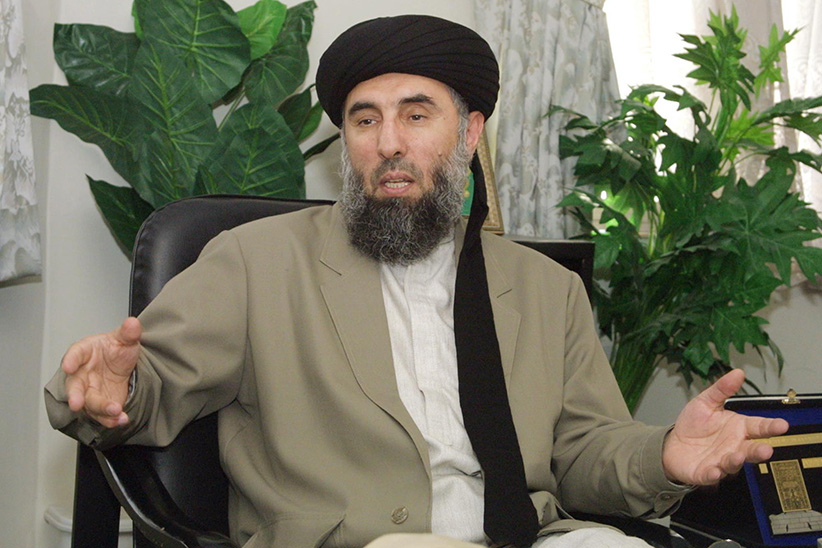Can this warlord save Afghanistan?
Gulbuddin Hekmatyar has a blood-soaked past. But he might be the only person who can blunt the Taliban’s alarming recent success.
Gulbuddin Hekmatyar, a former Afghan warlord in exile in Iran, speaks during an interview with the AFP in Tehran October 17, 2001. (Atta Kenare/AFP/Getty Images)
Share

In Afghanistan, friend and foe are often interchangeable categories. Since the 1990s, Afghanistan has lived through a period in which alliances have formed and then broken apart like the inside of a lava lamp. Chief among the opportunists has been Gulbuddin Hekmatyar, the warlord representing Afghanistan’s northeastern Pashtuns. Hekmatyar once curried favour with the U.S. when the Soviets were the enemy, then spent a stint with the Taliban when the U.S. and the Afghan government became the enemy before finally going solo (allegedly with Pakistani backing) in a bid to oust the U.S. from his country.
But the Afghan government has decided to put those inconvenient facts aside for a chance at peace. On Sept. 22, it signed a deal with Hekmatyar, offering him a place in government in exchange for his support in trying to bring the Taliban to the negotiating table. It took until last week to iron out the details, including removing Hekmatyar from the United Nations sanctions list, a move that was blocked by Russia until early February.
Now, Hekmatyar has finally come home. Last Saturday, the leader of the feared Hezb-e-Islami made his first public speech in Afghanistan in more than two decades, from the relative comfort of Jalalabad, his historical stronghold near the Pakistani border. He called on the Taliban to lay down their arms. He blamed the U.S. for creating the Taliban in the first place, a charge with only a thin connective thread to the facts. The U.S. abandoned Afghanistan after the retreat of the Soviets in 1988 and let the warlords, whom it had in large part armed, rip it to shreds in a fit of power lust, leading to the rise of the Taliban. The truth is, Hekmatyar—and men like him—bear more responsibility for the Taliban than the U.S.
Still, the Afghan government, and to a large extent the U.S., believe Hekmatyar has some kind of role to play in Afghanistan. Few experts believe he can succeed in convincing the Taliban to end their insurgency. According to a Feb. 1 report by the U.S. Inspector General for Afghan Reconstruction, the Afghan government only controls 57.2 per cent of Afghanistan’s 375 districts, a 15 per cent decline since the end of 2015. From January to November 2016, 6,785 Afghan security forces were killed while another 11,777 were injured, shocking numbers for a security establishment racked by desertions and tumbling recruitment.
Why would the Taliban come to the negotiating table when they are apparently winning the war?
There is another possibility, however, and it has less to do with Hekmatyar’s influence over the Taliban than it does his position in Afghan society. Since 2001, Afghanistan’s central government has had a difficult time coaxing rural Pashtuns into the national fold. Despite two Pashtun presidents–Hamid Karzai and now Ashraf Ghani–and countless negotiated distributions of Afghanistan’s powerful ministries to Pashtun ministers, Afghanistan’s Pashtun countryside has inexorably slid into the Taliban sphere.
RELATED: The anatomy of Harjit Sajjan’s Afghanistan operation apology
For many Pashtuns in the villages, both Karzai and Ghani are outsiders who do not represent their interests. Karzai was in India completing his master’s degree when the Soviet Red Army occupied Afghanistan in 1979. He returned to Pakistan in 1983 and began fundraising for the resistance, but never really played a major role in defeating the Soviets.
Ghani, a Western-educated academic, was bouncing around American universities at the time of the Soviet occupation, and later worked with the World Bank, only returning to Afghanistan in 2002 to become the finance minister under the Karzai government.
Both Karzai and Ghani hail from Afghanistan’s educated elite while Hekmatyar, who led the largest faction of Pashtun fighters arrayed against the Soviet Union, has tried to position himself as a man of the people. He has an untainted history of opposition to the foreign occupation of Afghanistan and marshals a following that includes former commanders and fighters who remain folk heroes in the Pashtun consciousness.
The hope is Hekmatyar can take the wind out of the Taliban’s sails by coaxing popular support in the countryside away from them. The cracks are already there, waiting to be exploited. Rising Islamic State influence in Afghanistan has put the fear in people. Pashtuns have never taken lightly to outsiders telling them how to be proper Muslims, and the Taliban’s struggle against ISIS offers a common enemy Afghans can rally against, as they did against the Soviets in the 1980s.
But Hekmatyar also comes with some blood-soaked baggage. His reputation for brutality has not been forgotten by those in Kabul who lived under his arbitrary bombardment during the civil war. Posters around the capital welcoming him home have been vandalized with red paint, representing the blood he spilled.
Women also worry that Hekmatyar’s return will set back the tenuous steps they have taken toward equality, a concern that resonates for Canada, which has focused the lion’s share of its development budget in Afghanistan on women’s empowerment.
“There will come a time when the government and its enemy will come up with a peace plan,” Kenneth Neufeld, Canada’s ambassador, told me in April. “But for Canada, equal rights for all is the basis for discussion.”
It’s unlikely Hekmatyar will be a voice for Afghanistan’s women, nor will he be the uniting figure Afghanistan so desperately needs. But his brand of divisiveness may be what helps Afghanistan marginalize the Taliban. His return changes the circumstances, and along with changing circumstances, some of the Afghan government’s foes could become its friends.